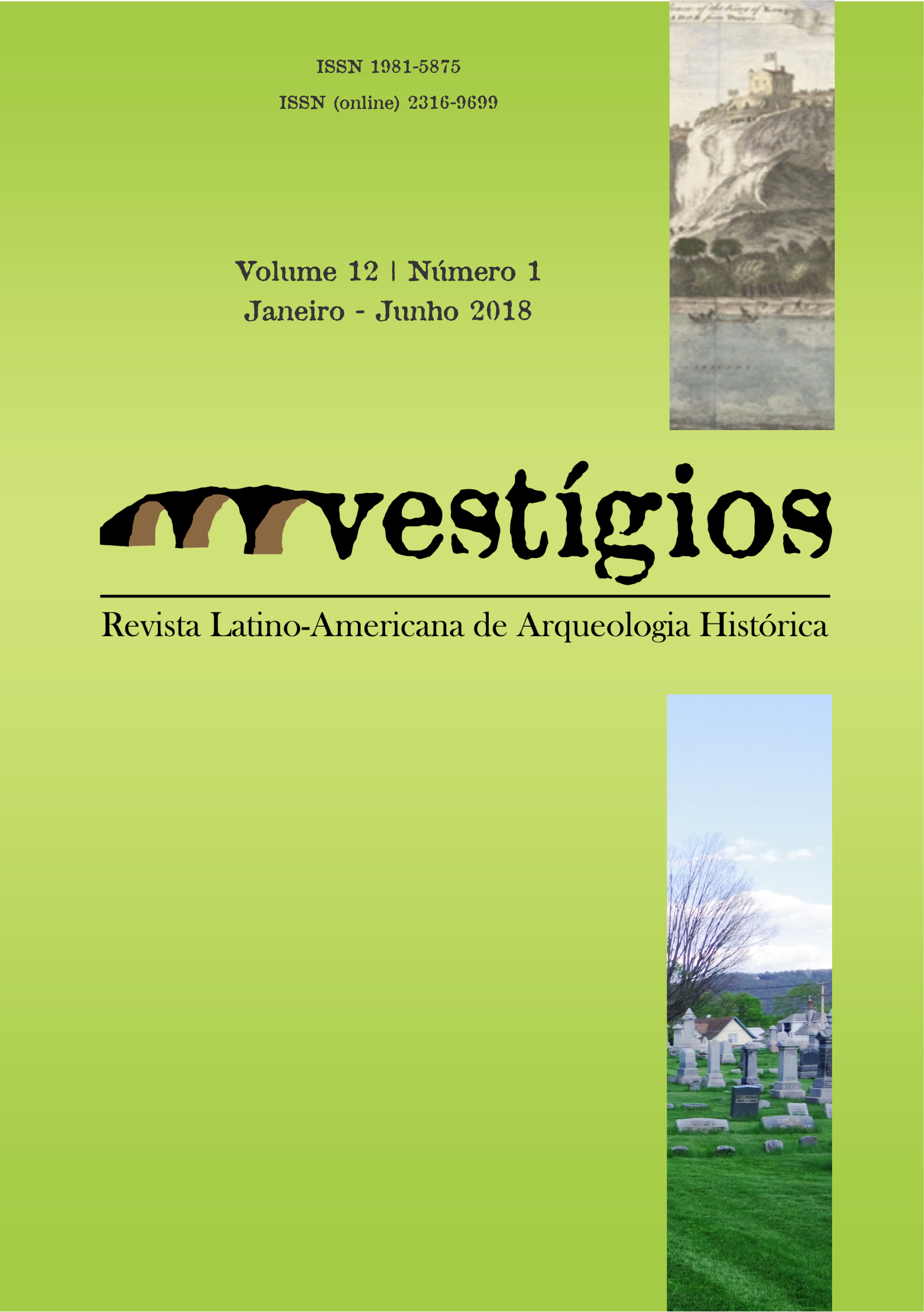Buscando simetrias no fim do mundo: pessoas, mamíferos marinhos e objetos na Antártica do século XIX
DOI:
https://doi.org/10.31239/vtg.v12i1.12116Palabras clave:
Antártica, Arqueologia Simétrica, agência, foqueirosResumen
Esta pesquisa buscou pensar os contextos de caça de mamíferos marinhos ocorridos durante as primeiras ocupações humanas na Antártica, no início do século XIX. Para isso foram utilizados conceitos da Antropologia e Arqueologia Simétrica, entendendo que não apenas as pessoas tiveram papel ativo na história dessas atividades, mas também outros atores. Considerando que mamíferos marinhos e objetos também atuaram nesse contexto, buscou-se mostrar como esses atores se relacionaram durante o período em que estiveram compartilhando do ambiente antártico. Através de vestígios arqueológicos encontrados nas Ilhas Shetland do Sul e de documentação escrita sobre o tema, criou-se uma nova narrativa, em que novos personagens puderam ser inseridos na história do continente antártico.
Referencias
BASBERG, B.; HEADLAND, R. 2008.The 19th Century Antarctic Sealing Industry. Sources, Dat and Economic Significance.NHH.Institutt for Samfunnsøkonomi, Department of Economics, Norges Handelshoyskole. . SAM 21, September.
BONNER, N. 1994.Seals and Sea Lions of the World.Blandford, London. Pp. 188-191.
BUSCH, B. C. 1985. The War Against the seals: A History of the North American Seal Fishery. McGill – Queen’s University Press.
CLARK, A. H. 1887. “=The Antarctic Fur-seal and Sea-Elephant Industry. In GOODE, G. B.The Fisheries and Fishery Industries of the United States: Section V - History And Methods Of The Fisheries.Government Printing Office.
CLARKE, W. B. 1850. Narrative of the Wreck of the “Favorite”- Adventures, Sufferings, and Privations of John Nunn. London.
COOPER, J. F. 1860. The Sea Lions or The Lost Sealers. W. A. Townsend and Company, New York. Cap. 15.
CRUZ, M. 2014. Incorporando comidas e contextos: a alimentação e o corpo nos grupos foqueiros nas Shetland do Sul (Antárctica, século XIX). 223f. Dissertação (Mestrado em Arqueologia), Faculdade de Filosofia e Ciências Humanas, UFMG. Belo Horizonte.
DÜRBECK, G.; SCHAUMANN, C.; SULLIVAN, H. 2015.Human and Non-human Agencies in the Anthropocene.Ecozon@ Vol. 6, N. 1.Pp118-136.
FREEMAN, C. & LEANE, E. 2011.Introduction. In: FREEMAN, C.; LEANE, E.; WATT, Y. Considering animals: contemporary studies in human–animal relations. Ashgate. Pp.1-10.
GONZÁLEZ-RUIBAL, A.Arqueología Simétrica: Un giro teórico sin revolución paradigmática.Complutum. v. 18. Pp. 283-285.
HODDER, I. 2012. Entangled : an archaeology of the relationships between humans and things. Wiley-Blackwell, John Wiley and Sons, Inc.
INGOLD, T. 2012. Trazendo as coisas de volta à vida. Horizontes Antropológicos, ano 18, n. 37, jan./jun. Porto Alegre. Pp. 25-44.
JEFFERSON, T.; WEBBER, M; PITMAN, R. 2015.Marine Mammals of the World.Elsevier Inc.
LATOUR, B. 1994a.Jamais fomos modernos: ensaio de antropologia simétrica, ed. 34. Rio de Janeiro.
LATOUR, B. 1994b On Technical Mediation – Pihlosophy, Sociology, Genealogy.Common Knowledge.Fall, Vol. 3, N.2.Pp.29-64.
LATOUR, B. 2012.Reagregando o social.Uma introdução à teoria do ator-rede.EDUFBA e EDUSC. Salvador.
MCFARLAND, S. & HEDIGER, R. 2009.Approaching the agency of other animals: An Introduction. In: MCFARLAND, S. & HEDIGER, R. Animals and agency: an interdisciplinary exploration. Koninklijke Brill NV, Leiden, The Netherlands. Pp.1-20.
MADDISON, B. 2014.Class and colonialism in Antarctic exploration, 1750–1920.– (Empires in perspective).Pickering & Chatto (Publishers) Ltd.
NOLASCO, R. 2018. Pessoas, mamíferos marinhos e objetos: Um olhar simétrico sobre a Antártica do século XIX. 213f. Dissertação (Mestrado em Arqueologia), Faculdade de Filosofia e Ciências Humanas, Universidade Federal de Minas Gerais, Belo Horizonte.
OLSEN, B. & WITMORE, C. 2015. Archaeology, symmetry, and the ontology of things: A response to critics. Archaeological Dialogues,22(2).Pp.187-97.
ORSER, JR, C. 1996.The Haunts of Historical Archaeology.A Historical Archaeology of the Modern World.Plenum,. Cap. 4.
RADICCHI, G. 2015. Os sapatos lobeiros-baleeiros: práticas de calçar do século XIX nas Ilhas Shetland do Sul (Antártica). Dissertação (Mestrado em Arqueologia). Faculdade de Filosofia e Ciências Humans, Universidade Federal de Minas Gerais. Belo Horizonte.
SALERNO, M. 2006. Arqueología de La Indumentaria: Prácticas e Identidad en los Confines Del Mundo Moderno (Antártida, siglo XIX).Del Tridente. Buenos Aires.
SHAPIRO, K., & DEMELLO, M. 2010. The state of human-animal studies.Society & Animals, 18(3).Pp.307-318.
SMITH, Ian. 2002. The New Zealand sealing industry: History, archaeology, and heritage management.New Zealand Department of Conservation. June.
STACKPOLE, E. 1953.The Voyage of the Huron and the Huntress: the American Sealers and the Discovery of the Continent of Antarctica. Hartford: the Marine Historical Association.
TAYLOR, N. 2011. Introduction: Thinking about animals. In: TAYLOR, N; SIGNAL, T. Theorizing animals: re-thinking humanimal relations. Koninklijke Brill NV, Leiden, The Netherlands. Pp.1-17.
WARKENTIN, 2009. T. Whale Agency: Affordances and acts of resistance in captive enviroments. In: MCFARLAND, S; HEDIGER, R. Animals and agency: an interdisciplinary exploration.Koninklijke Brill NV, Leiden, The Netherlands, Pp. 23-43.
WEBMOOR, T. 2007. Un giro más tras el ‘giro social’. El principio de la simetría en arqueología. In: GONZÁLEZ-RUIBAL, A.Arqueología Simétrica: Un giro teórico sin revolución paradigmática.Complutum, v.18. Pp. 296-304.
WEDDELL, J. 1825. A Voyage Towards the South Pole, performed in the years 1822-24.Paternoster-Row. London.
WITMORE, C. 2007a. Arqueología Simétrica: un manifiesto breve. In: GONZÁLEZ-RUIBAL, A. Arqueología Simétrica: Un giro teórico sin revolución paradigmática.Complutum, v.18. Pp. 305-313.
WITMORE, C. 2007b. Symmetrical archaeology: excerpts of a manifesto, World Archaeology, 39:4. Pp. 546 – 562.
WITMORE, C. 2014a.Archaeology and the New Materialisms.Journal of Contemporary Archaeology, 1.2. Pp. 203–224.
WITMORE, C. 2014b. Confronting Things” In: WITMORE, C. Archaeology and the New Materialisms. Journal of Contemporary Archaeology1.2. Pp. 239–242.
ZARANKIN, A. & SENATORE, M. X. 2007.Historias de un Pasado en Blanco. Arqueología Histórica Antártica.Argumentum. Belo Horizonte.
ZARANKIN, A.; HISSA, S.; SALERNO, M.; FRONER, Y.; RADICCHI, G.; ASSIS, L.; BATISTA, A. 2011. Paisagens em Branco: Arqueologia e Antropologia Antárticas – Avanços e desafios. Vestígios - Revista Latino-Americana de Arqueologia Histórica, v.5, n.2. Pp.9-51.
ZARANKIN, A. 2014. Relatório Técnico Final - Projeto Arqueologia e Antropologia Antártica.FAPEMIG – Programa Pesquisador Mineiro – PPM V. Belo Horizonte, Julho.
Descargas
Publicado
Número
Sección
Licencia

O trabalho Vestígios - Revista Latino-Americana de Arqueologia Histórica de https://periodicos.ufmg.br/index.php/vestigios/index está licenciado com uma Licença Creative Commons - Atribuição-NãoComercial 4.0 Internacional.
Baseado no trabalho disponível em https://periodicos.ufmg.br/index.php/vestigios/index.
Podem estar disponíveis autorizações adicionais às concedidas no âmbito desta licença em https://periodicos.ufmg.br/index.php/vestigios/index.


